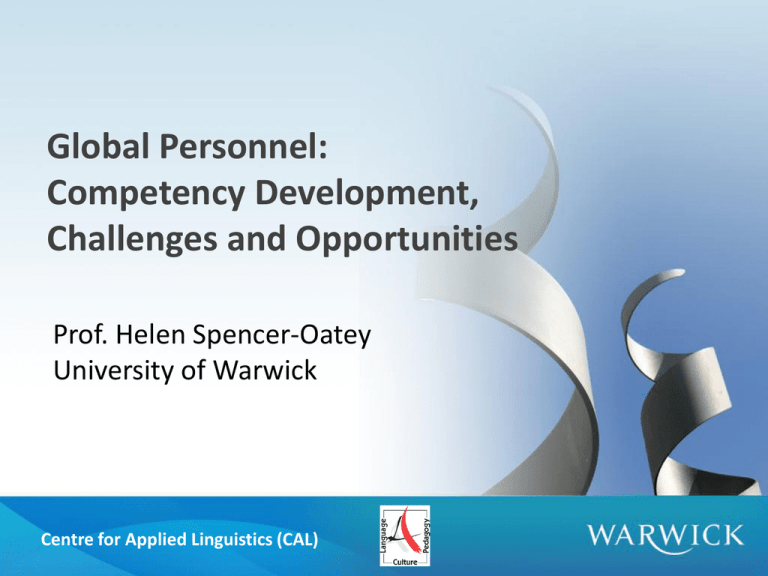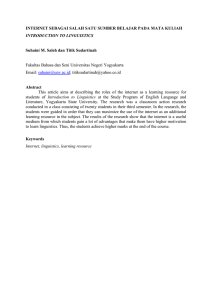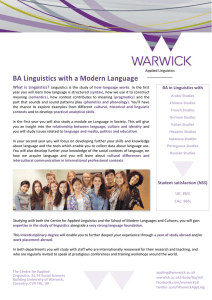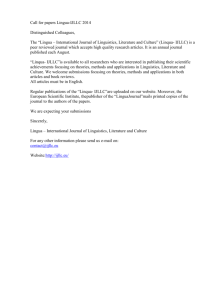Global Personnel: Competency Development, Challenges and Opportunities
advertisement

Global Personnel: Competency Development, Challenges and Opportunities Prof. Helen Spencer-Oatey University of Warwick Centre for Applied Linguistics (CAL) Overview Challenges of working globally • Communicating in English • Managing across Cultures • Power across Cultures Sources of the Challenges • The Impact of Culture Opportunities for Development • Courses at the University of Warwick • Global TIES (Training in Intercultural EffectivenesS) Centre for Applied Linguistics (CAL) Challenges of Working Globally Centre for Applied Linguistics (CAL) Communicating in English Proficiency level • Why is English proficiency important? • Aren’t interpreters sufficient? Impacts on participation and balance of power Centre for Applied Linguistics (CAL) Communicating in English Turn-taking styles Speed, pausing and back-channeling • How can these be different? Impacts on participation Impacts on mutual understanding Centre for Applied Linguistics (CAL) Communicating in English Directness-Indirectness • How can this vary? Impacts on mutual understanding Impacts on perceptions of politeness Centre for Applied Linguistics (CAL) Managing across Cultures Managing Meetings • • • • Who can talk when? Can you use mobiles (email, calls)? Can many people talk at once? Can people sleep? Impacts on perceptions of politeness Impacts on perceptions of interest/commitment Centre for Applied Linguistics (CAL) Managing across Cultures Managing Staff • What does/does not motivate staff? • How important is small talk? • Arrangements for lunch Impacts on staff morale Impacts on workplace atmosphere & mutual engagement Centre for Applied Linguistics (CAL) Understanding Power across Cultures Hierarchical levels • Identifying counterpart staff (i.e. equivalent roles & status) • Decision-making authority Impacts on negotiations Impacts on people’s evaluative judgments Centre for Applied Linguistics (CAL) Understanding Power across Cultures Judgments of Prestige • Assessing people’s status • Assessing the status of sectors/ companies; e.g. Manufacturers or Distributers? Impacts on negotiating power Impacts on people’s evaluative judgments Centre for Applied Linguistics (CAL) Sources of the Challenges Centre for Applied Linguistics (CAL) Influences on Behaviour Hofstede 1991, p.6 Centre for Applied Linguistics (CAL) Influences on Behaviour Hofstede 1991, p.6 Centre for Applied Linguistics (CAL) Culture as an Iceberg Visible Products Practices Invisible Centre for Applied Linguistics (CAL) Perspectives The 3 Ps of Culture Products Centre for Applied Linguistics (CAL) The 3 Ps of Culture Practices “President Obama’s embarrassing bow to the Japanese Emperor” Centre for Applied Linguistics (CAL) The 3 Ps of Culture Perspectives (Underlying beliefs and values) e.g. Hierarchy Centre for Applied Linguistics (CAL) Challenges & Culture Challenges Communication Management Products Power Practices Perspectives Cultural Influences Centre for Applied Linguistics (CAL) Developing Global Skills Centre for Applied Linguistics (CAL) Opportunities through Warwick Expertise in ‘Global Skills’ • Active researchers • International publications (e.g. “Culturally Speaking” in Japanese 異文化理解の語用論 ) • Tutors with experience of working in different countries, especially China, Japan, & Malaysia Centre for Applied Linguistics (CAL) Opportunities through Warwick Courses available • Short courses (face to face in UK) – Global skills – English for the global workplace – Global skills with English for the global workplace Centre for Applied Linguistics (CAL) Opportunities through Warwick Courses available • For Global Skills champions: – MSc Intercultural Communication for Business and the Professions • For undergraduate students: – BA Language, Culture and Communication Centre for Applied Linguistics (CAL) Opportunities through British Council Japan and Warwick Global TIES (Training in Intercultural EffectivenesS) • Interactive e-Learning course WITH • Live video-conferencing sessions, using latest CISCO TelePresence technology, with two tutors at Warwick (with two British Council staff overseeing the sessions) Centre for Applied Linguistics (CAL) Course Design • Assumes higher intermediate English language proficiency • Uses business case examples from several different countries to reflect the impact of culture on the workplace (e.g. Europe, China, Indonesia, Australia and New Zealand) • Live video sessions use tasks which ask participants to draw on their own professional experiences Centre for Applied Linguistics (CAL) Course Design Technology Best delivery mode identified through testing and piloting phase: • Moodle platform • Xerte Online Toolkits for e-learning component • Webex & Cisco TelePresence video conferencing for live sessions Centre for Applied Linguistics (CAL) Introductory live video session (breaking the ice; introductory tasks; instructors assign Module 1 work) Module 1: Understanding Culture for Work Conceptualises culture and explores the relationship between culture and communication Develops ability to analyse and interpret cultural influences in the workplace Includes strategies for dealing with difference at work and for developing intercultural effectiveness Centre for Applied Linguistics (CAL) Module 2: Becoming a Global Leader Explores the relationship between culture and beliefs and attitudes about leadership Provides opportunities to analyse cultural influences on leadership Examines the intercultural competencies needed for effective leadership in the intercultural workplace Centre for Applied Linguistics (CAL) Module 3: Working Effectively in Global Teams Explores beliefs and attitudes about working in teams Develops ability to analyse the ways culture influences team workers Deepens understanding of the intercultural competencies used by effective teams in the global workplace Centre for Applied Linguistics (CAL) Active Participation in the Live Sessions Centre for Applied Linguistics (CAL) Participant feedback Trial with professionals “I think my understanding of intercultural communication has developed considerably as a result of taking the course”. “It was useful to analyze and consider how to deal with people from different backgrounds with different ways of thinking and working styles”. Centre for Applied Linguistics (CAL) Participant feedback Trial with professionals “It is an ideal programme for people wanting to experience UK-style lectures and learn global communication skills”. “I would recommend the course within my own organization because we regularly work in multicultural teams and there are many beneficial practical elements to the course”. http://youtu.be/HHDXRSfaYdE Centre for Applied Linguistics (CAL) Course Completion Participants receive a Certificate of Completion from the British Council & University of Warwick Centre for Applied Linguistics (CAL) Course Length • We recommend two months for the full version of the course, with the four live sessions taking place once every two weeks and self-learning on the e-learning materials in between. • The course can be shortened or lengthened depending on your requirements. Centre for Applied Linguistics (CAL) Course Location • E-learning materials can be studied in your workplace or at home - wherever you have a computer with an internet connection. • Video lectures can be taken at your organization if you have a video conference facility. If not, they can be staged at a rented video conference facility. Centre for Applied Linguistics (CAL) Course Requirements Number of participants • 10 – 20 recommended English level • An English level of IELTS 6.0/TOEFL iBT 60 – 78/TOEIC 700 is recommended to make full use of the course. Cost • The total cost of the course varies according to your requirements (length of course, facilities, etc.). Centre for Applied Linguistics (CAL) Enquiries Tom Mayes Projects Manager British Council globalties@britishcouncil.or.jp Professor Helen Spencer-Oatey University of Warwick globalpad@warwick.ac.uk Centre for Applied Linguistics (CAL)







